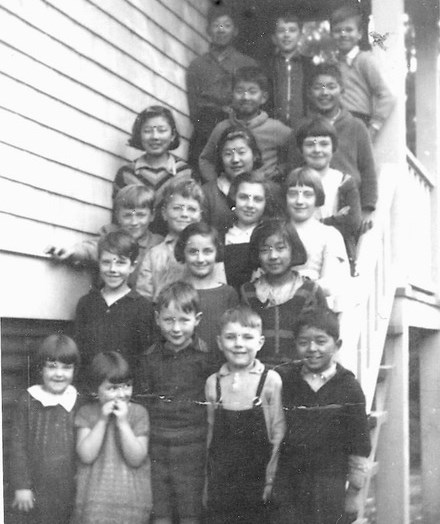Imagine arriving at school one morning to find seven empty desks. Friends with whom you laughed, played and had grown up with… gone without explanation or farewell.
This was Nex̱wlélex̱wm/Bowen Island in May 1942. Masao, Raku, Tame, Yoshiko, Kikue, Yemiko, and Isamu Yamada from King Edward Bay had vanished not because of anything they had done, but because of their race. The Yamahas had been in the community since 1922.
How does a teacher explain that your classmates were imprisoned in cattle stalls at the Pacific National Exhibition (PNE), awaiting forced relocation. How does a community reckon with the injustice that tore the family away? For both the Japanese Canadian children and their European Canadian classmates, their unacknowledged loss and the silence were painful reminders of a community forever changed.
During World War II, 22,000 Japanese Canadians were forcibly removed and their homes, land, boats and cars sold without their consent to pay for their incarceration. By 1945, families faced a cruel choice – move to Japan, a country most had never even visited, or move East of the Rockies.
These were the only two options available to people and moving to the West Coast was prohibited. These government actions, rooted in racism and economic interests, fractured communities including Bowen Island.
Denied voting rights in 1895 by the BC government, and petitioning for the vote since 1900, it was only on April 1, 1949, that all Canadian-Japanese finally received the right to vote and freedom of movement in Canada including to the Coast was restored. Relatively few came back to the Coast because they had already settled in Japan or East of the Rockies.
Now Bowen Island Museum and Archives has received a grant to establish a Japanese Canadian Legacies Heritage Site, honouring the pioneers who lived, worked, and played here. This project is more than history - it is a step towards healing and reconciliation — and an even stronger, more compassionate community and future for everyone.
If you or your family have stories, memories and/or photos from the late 1800s to 1942 and beyond with respect to Canadians of Japanese ancestry, or would like to contribute to this project in any way, please contact Cathy Bayly at Bowen Island Museum and Archives at 604-947-2655 or by writing to [email protected]



